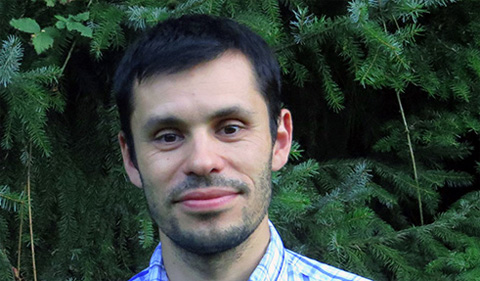
Dr. Viorel Popescu
The Environmental & Plant Biology Colloquium Series presents Dr. Viorel Popescu on “Wildlife conservation in a changing world” on Friday, Nov. 4, at 11:50 a.m. in Porter Hall 104.
Popescu is Assistant Professor of Conservation Biology in the Biological Sciences Department at Ohio University.
Abstract: In recent years, the discipline of Conservation Biology has been moving from being defined as a “crisis discipline” to taking a proactive approach to prevent the loss of biodiversity and informing conservation management. My work broadly spans many biodiversity threats in the animal terrestrial realm, such as habitat loss, overexploitation or climate change, in an effort to predict the response of animal populations to multiple human-induced stressors. I will present results from two ongoing projects tackling sensitive issues in biodiversity conservation: trophy hunting and renewable energy planning. First, I will delve into the realities of hunting large carnivores in Romania, one of the last bastions for brown bears, wolves and lynx in Europe. Hunting in Romania is not backed by science, and decisions on how many animals to cull each year have been heavily criticized by the EU. We used the official government data on large carnivore abundance, and found that reported data was not plausible from a biological standpoint, and that abundances were often overestimated to increase hunting quotas and revenue for wildlife managers. I discuss implications for the practice of hunting carnivores in general, and reactions of the Romanian wildlife authorities to these findings. Second, I will showcase the process of developing an interactive decision-support tool for small hydropower development in British Columbia. BC has one of the most progressive C-neutrality mandates and is seeking to tap its overabundant small hydropower potential for electricity. However, adoption of renewable technologies has outpaced our understanding of their ecological impacts, and alternative planning approaches are needed to reduce the conflict between conserving wildlife and providing clean energy. Using systematic conservation planning algorithms, we evaluated win-win situations for both terrestrial/aquatic vertebrate conservation (~400 species) and renewable energy development. Using input from 50+ stakeholders over the course of 4 years, we developed species distribution models, and 10,000s of alternative land use scenarios that prioritized both conservation and development values, while maintaining social relevance, and using science for solving wicked environmental problems and informing decision making.



















Comments